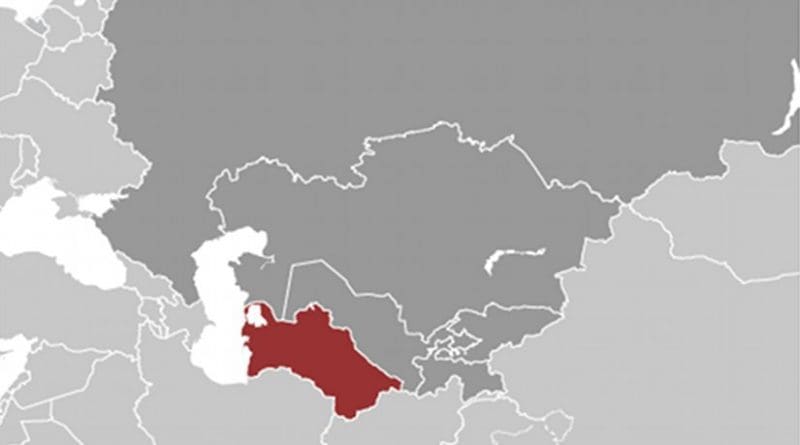Turkmenistan: NGOs Document Widening Crackdown On Dissent
By IPHR
Over the past year, the Turkmenistani government has widened its crackdown on dissent in response to a surge in anti-government criticism on social media and the emergence of an anti-government protest movement abroad. A new briefing paper published by International Partnership for Human Rights (IPHR) and Turkmen Initiative for Human Rights (TIHR) documents this crackdown and the systematic violations of the freedoms of expression, association and peaceful assembly seen in the Central Asian country.
“The Turkmenistani government tolerates no dissent and has sought to rein in the growing expressions of discontent by using various tactics to step up pressure on critical voices. This has led to a decline in the activity of the protest movement and growing disillusionment about the prospects for positive change in the country,’’ said Farid Tukhbatullin, chair of TIHR. ‘’We need the support of the international community to turn the tide and halt this alarming trend.’’
Turkmenistan is one of the world’s most closed countries, regularly featuring at the bottom of global freedom rankings. The recent increase in civic activity has come in a context in which the government has persistently denied the national COVID-19 outbreak, ignored the hardships caused by the protracted economic crisis in the country and failed to deliver on its duty to meet the basic needs of citizens.
Most people who have dared to speak up against the repressive policies of the Turkmenistani government are Turkmenistani students, migrants or refugees who live abroad. Turkmenistani security services keep close track of social media activists, protest participants and others who openly criticise the government and have increasingly targeted “inconvenient’’ individuals based abroad through their relatives in Turkmenistan. One example is that of Turkey-based activist and journalist Rozybai Jumamuradov, whose relatives in Turkmenistan were recently subjected to several acts of intimidation aimed at coercing him to stop criticising the government. The security services even summoned and threatened the activist’s 14-year-old nephew.
The Turkmenistani authorities have also enlisted the help of local authorities in friendly states, above all Turkey and Russia, in their attempts to silence dissent. In several cases, activists living in these countries have been detained and intimidated by local law enforcement officials and pressured by university staff, following apparent interventions by Turkmenistani authorities. For example, dozens of people who gathered for a rally against the government’s policies in Istanbul in July 2020 were detained, and one of them, Dursoltan Taganova was ordered to be deported. The official grounds for the deportation order were a visa violation but the circumstances of the case indicate that it was in retaliation for her involvement in the anti-government protest movement. After an international outcry, Taganova’s deportation was halted and she was released from detention after three months but she nevertheless remains at risk and has been subjected to renewed intimidation. Others such as social media activists Rozgeldy Choliev and Malik Allamyradov have faced informal threats of deportation from Russia to Turkmenistan, as part of intimidation campaigns targeting them.
Any government critic returned to Turkmenistan would be at serious risk of politically motivated imprisonment, torture, and disappearance – tactics long used by the Turkmenistani authorities in their campaign against dissent.
In recent months, the Turkmenistani authorities have also tracked down and intimidated a number of individuals based inside Turkmenistan, who have dared to express views critical of the government on social media or engaged with activists and groups based abroad. Journalist Nurgeldy Khalykov and lawyer Pygambergeldy Allaberdyev were both imprisoned last year on spurious charges believed to be retaliation for such actions: Khalykov had cooperated clandestinely with the Netherlands-based Turkmen News for several years, while Allaberdyev was targeted because of his alleged links to the anti-government protest movement abroad.
In addition to going after participants and potential participants in anti-government rallies abroad, the Turkmenistani authorities have sought to curb rare spontaneous protests inside the country held by people expressing their frustration at difficulties related to the ongoing economic crisis. While denying the scope and impact of the economic crisis, the authorities have continued to use state-controlled media to promote the official narrative of Turkmenistan living in an era of happiness and prosperity, and to forcibly mobilise citizens for mass events aimed at demonstrating the purported wellbeing of the nation. The authorities have pressured medical workers to participate in covering up the national COVID-19 outbreak and detained individuals who documented the havoc caused by a devastating hurricane that hit the country last year.
There is currently no space for genuinely independent media or civil society groups to operate inside Turkmenistan. The websites of exile-based organisations, social networks and communication platforms have been arbitrarily blocked inside the country, and the authorities have recently intensified their campaign against internet censorship circumvention tools by systematically blocking such tools and intimidating people using them to access content critical of the government. Exile-based groups who report critically about the situation in Turkmenistan have also been targeted by cyberattacks and content takedowns based on copyright complaints believed to have been initiated by the Turkmenistani authorities as part of their efforts to suppress dissent.
‘’We appeal to the international community to hold the Turkmenistani government accountable for its violations of the rights of citizens to seek, receive and impart information regardless of borders and to interact with likeminded people on issues of concern to them,” said Brigitte Dufour, IPHR’s director. ‘’Without sustained international pressure, there will be no end to the relentless persecution of people in- and outside Turkmenistan who speak out against repression and demand human rights and democratic change in the country.’’
The new IPHR-TIHR briefing paper has been prepared based on monitoring, documentation and reporting carried out by the two organisations as part of their cooperation with the CIVICUS Monitor on tracking civic space in Turkmenistan. It draws on information obtained by TIHR with the help of its network of contributors in- and outside Turkmenistan, as well as information reported by other independent groups and outlets covering Turkmenistan. Download the paper here.

